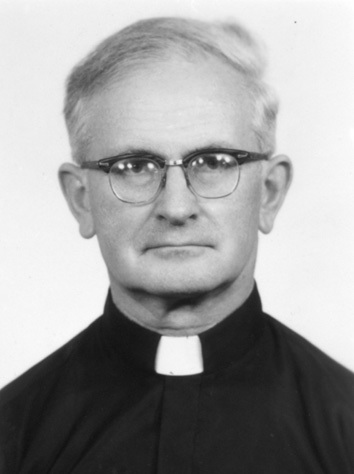I joined WYK in F6, brought in by Father Peter Brady from QES.
This piece of music and the movie led me to think about him again.
He is one of my most respected teachers and had a profound impact in my early days in WYK and after, and whenever I am in my own depressions, I thought of him.
Next Wednesday, February 14, 2018, is Ash Wednesday. This piece of MUSIC and MOVIE remind me of his work and all the missionary work of SJ. "Remember that you are dust, and to dust you shall return". Perhaps, one day, I will meet Father Brady again.
I went to WYK, a Jesuit school after QES and felt deeply with the MUSIC and the MOVIE when I came across them. Father Peter Brady SJ, was our spiritual leader at QES Catholic Society and took me to WYK in F.6 in September, 1969.
He wrote our F6 Ethics book. I did not disappoint him and came first in this subject in F6.
I particularly like the memoir on our Ontario Alumni website.
EATURED ARTICLES
For us who have a Catholic faith, the MUSIC is also a great reminder for us (and the church) and to ponder what the Church has done or failed to do during those dark ages and how we should deal with this in future.
The Mission the MOVIE:
In a final exchange between Cardinal Altamirano and Don Hontar, Hontar laments that what happened was unfortunate but inevitable because "we must work in the world; the world is thus." Altamirano replies, "No, thus have we made the world. Thus have I made it." Days later, a canoe of young children return to the scene of the Mission massacre and salvage a few belongings. They set off up the river, going deeper into the jungle, with the thought that the events will remain in their memories. A final title declares that many priests continue to fight for the rights of indigenous people. The text of John 1:5 is displayed: "The light shineth in the darkness, and the darkness hath not overcome it."
In 1750, in the rain forest of central South America, Guarani Natives tie a Jesuit priest to a tree, push this crucifix into the river rapids, and watch it plunge over the majestic Iguazu waterfalls. Soon Father Gabriel (Jeremy Irons), another Jesuit, arrives to carry on the work of the martyred priest. After scaling the cliffs beside the falls, he takes out an oboe and begins to play. Guarani Natives emerge from the dense jungle and surround him. Through the music, however, they recognize him as a man of peace and take him into their midst. During a raid for Guarani Natives above the falls, the mercenary of slaves Rodrigo Mendoza (Robert De Niro) encounters Gabriel and learns that the Jesuits are building a mission there. Months later, Mendoza and Gabriel meet again. In a fit of jealous anger over losing his mistress, Mendoza has killed his brother, and he has sunk into a deep depression. Gabriel challenges him to have the courage to live and to choose a penance for his crime. When the priest, Fielding (Liam Neeson), and other Jesuits next climb the cliffs by Iguazu Falls, Mendoza is with them, dragging behind him a sack filled with his armor and sword. At the mission, the Guarani people, whom he had once persecuted, welcome him into their community. Eventually, Mendoza takes vows to become a member of the Jesuit order.
Here is the movie for your causal watching again.
It's not incidental that the PianoGuys decided to have a performance at Iguazu Falls to promote their music.
God bless all the teachers and SJ priests I had the good fortune to meet and learn from.
Wilfred Wei
----------------------------------------------------------------
Gabriel's Oboe and The Mission
"Gabriel's Oboe" is the main theme for the 1986 film, The Mission, directed by Roland Joffé. The theme was written by Italian composer Ennio Morricone, and has since been arranged and performed several times by artists such as Yo-Yo Ma, Holly Gornik, and Brynjar Hoff, among others. The theme has been called "unforgettable" and a "celebrated oboe melody". V ocalist Sarah Brightman begged Morricone to allow her to put lyrics to the theme to create her own song, "Nella Fantasia". In 2010, Morricone encouraged soprano Hayley Westenra to write English lyrics for "Gabriel's Oboe" in her album Paradiso.
The soundtrack for the film was very well received amongst critics, being nominated for an Academy Award for Best Original Scoreand earning Morricone the Golden Globe Award for Best Original Score.
In the film, the theme is most prominently used when the protagonist, the Jesuit Father Gabriel, walks up to a waterfall and starts playing his oboe, aiming to befriend the natives with his music so he can carry his missionary work in the New World. The Guaranítribesmen, who have been stalking him from a distance, approach Gabriel for the first time, puzzled by the sounds of the unknown instrument. The chief of the tribe, however, is displeased by this, and breaks Gabriel's oboe. This marks the beginning of the relationship between Father Gabriel and the Guaraní natives.
Several orchestras have performed "Gabriel's Oboe", often under the direction of Morricone himself. The most famous renditions of the piece, other than in the movie, are probably those found in the Morricone Conducts Morricone series of concerts during the mid-2000s.

